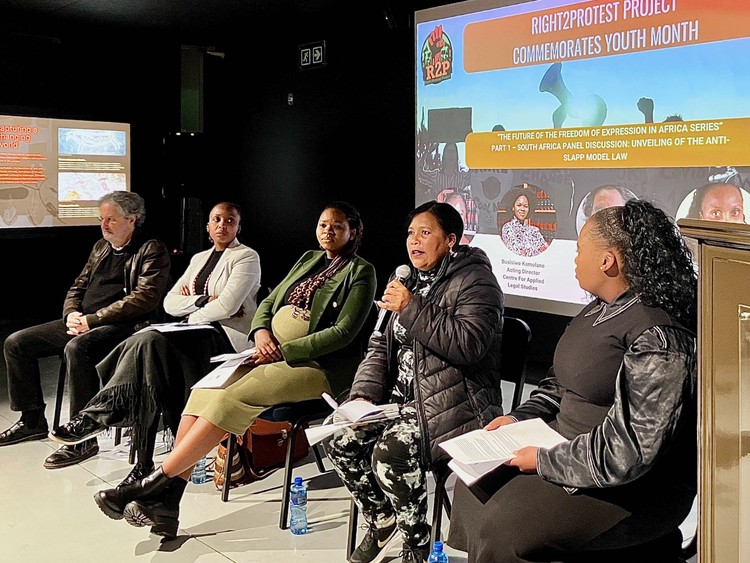New law proposed to stop SLAPP suits
The Centre for Applied Legal Studies and Right2Protest hope legislators will adopt it to protect journalists and activists
On Tuesday the Centre for Applied Legal Studies, supported by Right2Protest, proposed a model law for protection against “SLAPP suits” (Strategic Litigation Against Public Participation). Photo: Masego Mafata
- The Centre for Applied Legal Studies (CALS) and Right2Protest (R2P) have proposed a law for protection against Strategic Litigation Against Public Participation (SLAPP) suits.
- CALS said the proposed law addresses gaps in existing laws on SLAPP suits.
- The organisations hope this law will be adopted by the legislature to protect journalist and activists.
“SLAPP is a new approach to censorship, an effort to find different ways to make the lives of journalists and activists difficult,” said Anton Harber, executive director for the Campaign For Free Expression. He was speaking on Tuesday at Wits University at the launch of a proposed law to protect people against Strategic Litigation Against Public Participation (SLAPP) suits.
“We need to not just defend but actively prevent SLAPP actions,” he said.
The Centre for Applied Legal Studies (CALS), supported by Right2Protest (R2P), proposed the law. The law addresses a growing concern over SLAPP suits, a strategy used by corporations and wealthy individuals to stifle dissent.
In SLAPP suits critics are sued for huge amounts for alleged defamation in order to discourage, censor, intimidate and silence them.
Harber said it was concerning to note the increasing use of SLAPP suits around the world to silence journalists and activists.
Busisiwe Kamolane-Kgadima, CALS acting director, said, “We realised that activists were being arrested unlawfully, slapped with defamation cases and facing increasing victimisation. So we undertook a study to really understand what is happening to activists in South Africa. We saw a clear gap in the law, which is why we developed the model law.”
According to CALS, the proposed law is a blueprint for the legislature to work from when drafting laws in response to SLAPP suits. “They are free to accept in parts or in whole and make adjustments,” said Jessie Ditshego from CALS.
The proposed law intends to prevent and deter the “frivolous” use of legal processes to undermine the right of people to criticise corporations. It also aims to determine the court procedure for the adjudication of SLAPP suits and to provide remedies for those subjected to SLAPP suits.
Speaking at the launch, community activist Davine Witbooi (formerly Davine Cloete) from Lutzville, said, “When we stood up to defend our community against big mining corporations, nobody told us about SLAPP suits and how to defend ourselves against them. When I received a summons in 2017, people that I was working with on the ground stopped associating with me because they were scared.”
Witbooi (then Cloete) was one of six activists and lawyers involved in a protracted SLAPP suit brought by Australian mining company Mineral Commodities Ltd (known as MRC) and its South African subsidiary, Mineral Sands Resources (MSR).
The company accused six activists and lawyers of defaming the mining interests in books, interviews and presentations relating to the mines controversial activities on the Pondoland coast at Xolobeni and at the Tormin mineral sands mine on the West Coast. The matter was settled out of court last year.
Dr Keneilwe Radebe, a lecturer and commissioner at the Law Reform Commission said anti-SLAPP legislation is necessary to prevent people from weaponising the law and subjecting activists and journalists to lengthy, meritless legal processes.
Support independent journalism
Donate using Payfast

Don't miss out on the latest news
We respect your privacy, and promise we won't spam you.
Letters
Dear Editor
It is of great concern that government agencies often abuse this form of litigation to silence even moderate criticism, and, ironically, often to protect the maladministration of justice or poor governance in that organisation. SLAPP suits are also used to quash allegations of sexual misconduct. The criticism may be as mild as complaints regarding service delivery or just asking difficult questions. The taxpayer is effectively funding his/her/their own abuse. People in service of citizens and in power must understand that they may be cloaked with innocence until proven guilty because of trust awarded to them, and that no-one in government is more elevated than the ordinary citizens they are paid to serve. All SLAPP suits are a form of disrespect to perceived “subordinates” and, as respect forms the backbone of ethics, both unconstitutional and unethical.
© 2024 GroundUp. This article is licensed under a Creative Commons Attribution-NoDerivatives 4.0 International License.
You may republish this article, so long as you credit the authors and GroundUp, and do not change the text. Please include a link back to the original article.
We put an invisible pixel in the article so that we can count traffic to republishers. All analytics tools are solely on our servers. We do not give our logs to any third party. Logs are deleted after two weeks. We do not use any IP address identifying information except to count regional traffic. We are solely interested in counting hits, not tracking users. If you republish, please do not delete the invisible pixel.

